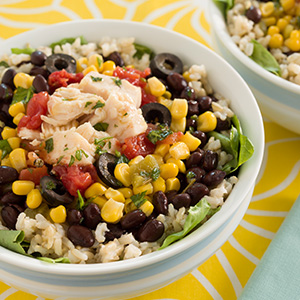February is National Canned Food Month! Americans have long relied on canned foods as nutritious, convenient and affordable staples for preparing quick and flavorful home-cooked meals. Canned foods are a great source of potassium, dietary fiber, calcium and vitamin D — all identified as shortfall nutrients in the 2010 Dietary Guidelines for Americans.
10 Reasons Cans Will Get You Cooking
Canned foods are a smart solution for better eating in today’s fast-paced world. The can locks in freshness, flavor and nutrition without sacrificing convenience, enabling you to be confident about creating more, healthy meals. Start cooking today!
- Cans seal in freshness, nutrition, quality and taste. When food goes through the canning process, nutrients are locked in, so the amount of vitamins and nutrients in the food is the same on the day it was canned as it is a year from the canning date.
- Canned fruits and vegetables have the same nutrients as fresh and frozen. In fact, a review of the research found that canned fruits and vegetables are nutritionally similar to fresh and frozen — and, in some cases, even better.
- Canned foods are affordable. Families can stretch their grocery budgets by choosing canned produce and meat. Plus, you save money because canned foods don’t easily spoil!
- Canned foods are convenient. Families have fast-paced lives, and they can’t always plan meals around work and kids’ activities. Having canned foods in the pantry provides a great option for a quick and easy meal, so families don’t have to eat out.
- Cans seal out foodborne pathogens. The high-heat canning process is one of the safest when it comes to preserving food because it prevents the growth of microorganisms that cause foodborne illnesses.
- Cans provide endless variety all year long. More than 1,500 food items come in cans. This provides you with almost limitless options in creating flavorful and nutritious meals for your family and friends.
- Canned foods boost nutrients, not sodium. Many canned foods, including vegetables, soups and meats, are available in sodium-free and low-sodium options. Plus, by draining and rinsing canned foods with water, you can reduce the sodium by 36 to 41 percent, according to recent research.
- Cans protect your food. The can is a protective container, sealing in great taste and protecting against microbes.
- Cans reduce food waste A well-stocked pantry can be the secret to whipping up a tasty meal from food items that may otherwise go to waste. Fresh produce can spoil before you have the chance to eat it, and keeping a well-stocked pantry helps people reach their daily goals for fruits and vegetables.
- Cans are environmentally friendly Canned foods are environmentally friendly because the metal cans are endlessly recyclable.
So now, it’s time to get cooking!
Chicken Burrito Salad

No need to wait in line! Make a Chicken Burrito Salad from the comfort of your own home. Canned chicken is a convenient and tasty way to incorporate more nutritious protein into your diet. In fact, studies have shown that eating protein helps people feel fuller longer!
Prep Time: 15 minutes
Servings: 6
INGREDIENTS
Salad:
1 small head romaine lettuce, torn into small pieces
1 cup cooked brown rice
1 15-ounce can black beans, drained and rinsed
1 14-ounce can diced tomatoes
1 10-ounce can chicken breast chunks, drained and flaked
1 10-ounce can corn kernels, drained
1 4.25-ounce can diced green chilies, drained
1 2.2-ounce can sliced ripe olives, drained
Dressing:
2 tablespoons fresh-squeezed lime juice
1 tablespoon fresh chopped cilantro
3 tablespoons extra-virgin olive oil
Salt and ground black pepper to taste
Prepare Salad: In large platter or individual bowls, place lettuce leaves. Top with brown rice, black beans, diced tomatoes, chicken, corn, green chilies and black olives.
Prepare Dressing: In small bowl combine lime juice and cilantro; whisk in
olive oil. Add salt and pepper to taste. Drizzle dressing over salad.
Visit www.CansGetYouCooking.com for more recipe ideas!

